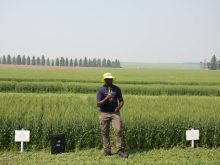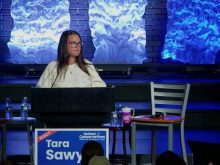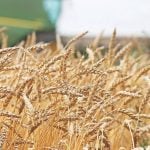A well-known agronomist with Alberta Grains is taking on a new leading role in the commission’s research.
Jeremy Boychyn, who’s worked with the former Alberta Wheat and Barley since 2018, will oversee the agronomy and extension portfolios under his new title of director of research, agronomy and extension.
An Alberta Grains news release lauded Boychyn’s “significant advancements and contributions to the agricultural research and extension communities in Alberta.”
Read Also

AgSphere cultivates new era for agri-food innovation
A new Calgary-based hub seeks to join universities, investors, multinationals and start ups to spur cutting-edge advances in farm-to-fork sector.
“I’m super excited to be taking a role in the extension world,” said Boychyn, who calls the central Alberta town of Carstairs home.
“With the commission I’ve come to understand and learn a lot of where producers see value in research information. And I think that’s put me in a good position to be able to make some strong decisions on where we take our research.”
Wrote Devin Hartzler, second vice-chair and region two director for Alberta Grains,
“Jeremy’s proven history of delivering impactful research and agronomy programs will be crucial in propelling the success of Alberta Grains and ensuring our farmers have access to the necessary tools and knowledge to thrive.”
One of Boychyn’s most popular initiatives with Alberta Grains has been Plot2Farm, a small plot research effort that offers research protocols to farmers that can be implemented with an agronomist’s assistance.
He also manages The Growing Point podcast and newsletter which provides agronomic knowledge to farmers and agronomists based on scientific research and Alberta Grains-funded projects.
He’s also been “pivotal” in the development of the commission’s spring wheat production manual which covers virtually everything to do spring wheat production.
Boychyn hopes to help develop and fund research that meets the needs and priorities of Alberta grain producers in the short and long terms.
“And then tying that into extension activities we are implementing and collaborating with to make sure that information is driven right to the farm gate so producers can adopt it and make the most use of those research levy dollars.”
He identifies fungicide resistance in fusarium head blight, wheat stem sawfly, residue management and variability in a number of categories as some of the biggest challenges Alberta grain growers are currently facing.
“We’re producing higher yielding crops which are producing more residue, managing quality issues that relate from variable weather conditions, and … managing our crop nutrient and our variety selections to make sure that you’re getting the most out of the inputs that we are using,” he said.
Growing up on a fruit and vegetable farm in Ontario sparked an early interest in agronomy in Boychyn. His first job after graduating from the University of Guelph was a sales position with Cargill. However, his attraction to the field of agronomy never subsided.
“I started as a sales rep and observed what the agronomist at my location was doing in terms of providing actionable information for producers based on what was going on in the field at that time. And I kind of was drawn to that piece of farmer support,” he said.
“So when that agronomist left I quickly jumped into that role and since then it just kind of snowballed and grew into different opportunities.”
In his non-agronomic and extension life, Boychyn enjoys training bird dogs for upland bird hunting and spending time with his two-year-old son.
“We enjoy walking around and seeing the farm operations around here and letting him ride around in the feeder and the combine when the opportunity arises with producers in the area,” he said.
“A lot of my time now is spent enjoying time with him and watching him grow.”
Despite his new leadership position, he will still be in the field frequently.
“Part of why I’m able to do what I do is I’m able to communicate with farmers and have those conversations to understand the specific challenges they’re dealing with in different parts of the province. So that I certainly won’t lose.”
















